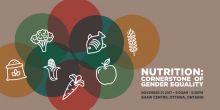
Ottawa, Canada – The Global Nutrition Report 2017 was officially launched in Canada today at “Nutrition: Cornerstone of Gender Equality.” The Report, released globally on November 3rd, studied 140 countries and found that almost every country in the world now faces a serious nutrition-related challenge, stemming from undernutrition or obesity.
Three important forms of malnutrition were used as an indicator of broader trends:
childhood stunting, children too short for their age due to lack of nutrients, suffering irreversible damage to brain capacity
anaemia in women of reproductive age, a serious condition that can have long term health impacts for mother and child
overweight adult women, a rising concern as women are disproportionately affected by the global obesity epidemic.
The Report found ‘significant burdens’ of one or more of these indicators present in all 140 countries studied and a further 88% face a serious burden of two or three of these forms of malnutrition.
Malnutrition, rising rates of anaemia and obesity concerns were highlighted as especially problematic for women and girls. Nutrition: Cornerstone of Gender Equality, which brought together leading international development organizations, government officials, researchers and global health champions, highlights nutrition’s critical role in women’s empowerment, and the need for urgent nutrition action to reach the Sustainable Development Goals.
Key findings of the Report were presented by Luz Maria De-Regil, Vice President, Global Technical Services of Nutrition International, one of the co-organizers of the conference. Ms. De-Regil emphasized that addressing malnutrition is key to achieving gender equality.
“Women and girls can only have equal opportunities to grow, learn, earn and lead when they have adequate nutrition,” said Ms. De-Regil. “Gender equality and nutrition need to be addressed universally, across the Sustainable Development Goals, with women and girls empowered to act as advocates for their own health and nutrition.”
In many parts of the world, women and girls eat least and last within their households. Eating least and last is driven by knowledge, attitudes and practices that undervalue healthy and adequate diets for women and girls based on their lower value, and which limit their decision-making power over food purchasing and distribution.
Malnutrition amongst girls and women also exacerbates gender inequalities in the medium and long term. Anaemia and stunting in women and girls affect cognitive development, school performance, and labour productivity and earning potential. They also impact birth outcomes – extending the cycle of poverty. Conversely, good nutrition can act as an equity enhancer, by ensuring women and girls can grow to their full potential, learn, earn and lead.
Malnutrition resulting from nutrition-sensitive socio-economic conditions, such as poor water, sanitation and hygiene (WASH) conditions, is also affected by and affects gender inequalities. 50% of undernutrition is associated with infections caused by poor water, sanitation and hygiene and it is frequently women and girls’ health, rights and opportunities which are most impacted by WASH-related undernutrition. The evidence is clear that investing in ‘nutrition-specific’ interventions alone will not end malnutrition.
To address the plague of malnutrition and gender inequality, we need to move faster, to go further and to be innovative. However, global donor funding for nutrition rose by just two per cent in 2015, representing a fall in the overall percentage of global aid funding and the Report calls for funding to be ‘turbo charged’ with a tripling of funding of global investments in nutrition.
Canada is a long-time leader in promoting nutrition and human rights around the world. By focussing on how gender equality, human rights and nutrition interact, we can finish the job. Investing in holistic and innovative programs to address gender equality and nutrition would be in Canada’s best interest as progress on many of our international goals, including decreasing gender inequality globally and the achievement of the Sustainable Development Goals (SDGs), requires integrated, rights-based, feminist approaches that also requires incorporating nutrition as a cross-cutting issue. Nutrition is central to achieving the SDGs and the objectives of Canada Feminist International Assistance Policy.
Pledges to invest in nutrition must be ‘concrete’ and ‘acted upon’, not ‘empty rhetoric’, the report said. As one of the world’s leading funders of global nutrition programs, the government of Canada should ensure that funding for nutrition remains a key priority and should ensure increased funding for nutrition are aligned with a commitment to increasing funding for Canada’s international aid envelope.
Canada will have multiple opportunities over the next 18 months for renewed action on fighting malnutrition and gender inequality, including the G7 Presidency and hosting Women Deliver 2019, the world’s largest conference on the health, rights and wellbeing of women and girls. We call upon Canada to take advantage of these opportunities to champion the link between nutrition and gender equality on the global stage and establish nutrition as a key element of women’s economic empowerment.
For more information:
To learn more about the Global Nutrition Report 2017, visit http://www.globalnutritionreport.org/